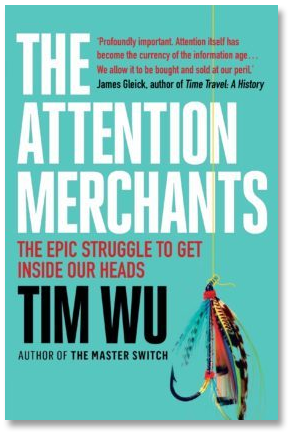The Attention Merchants, book review: Charting the rise of ad-supported media


The great comic poet Ogden Nash famously wrote:
"I think that I shall never see
A billboard lovely as a tree
Indeed, unless the billboards fall
I'll never see a tree at all."
Nash, who died in 1971, was marking the incursion of advertising along America's highways as car ownership became widespread enough to deliver a large enough captive audience. Today, we barely notice billboards what with rampant advertising noise: they're on cash register receipts, luggage carts, stair risers, everywhere people congregate, and everywhere online. Plus, each medium has ratcheted upwards its noisy demands for our attention: Nash's billboards were paint and posters; today Piccadilly Circus is barely visible under the LEDs.
In The Attention Merchants, Columbia professor Tim Wu, who coined the term 'network neutrality', surveys the history of advertising-supported media. Wu's story begins in 1833, when Benjamin Day figured out that he could sell his newspaper a lot cheaper than his rivals if he shored up reader revenues with advertising. He was, Wu writes, the first to understand that his customers were his product.
Today, all media owners know this, and 'cheaper' has given way to 'pay with data', which they pretend means 'free' -- a business model that physical-world entities (airports, retailers, and many others) are scrambling to emulate via sensors and location tracking. Wu's book outlines the steps by which we got to a point where our attention is routinely appropriated. Snake oil salesmen, warmongers, RCA's desire to sell radios, two world wars, personal reinvention, 1960s counterculture, movies, TV quiz shows, and the politics of movie production all played their part.
Counter-moves
Yet alongside these moves there have always been counter-moves when, as Wu writes, the public begins to feel unfairly tricked, their attention appropriated without their consent.
The city of Paris at first embraced the colourful posters popping up everywhere, then an anti-poster movement formed to lobby for restrictions. Even advertising mogul David Ogilvy declared he intended to form a secret society to benefit mankind by chopping down posters when he retired. Today, at a time when attention hijacking has colonised the web and been democratised via affiliate links and social media, that movement takes the form of online ad-blocking. Wu recounts all this history in decreasing detail as he moves chronologically toward our time.
Five years ago, in his book Writing on the Wall, Tom Standage argued that the last 150-odd years of commercial media have been an anomaly. Before it came centuries, even millennia, of sharing information either for free or paid for by patronage. Wu finds commercial notices and signs even in classical times, but, like Standage, he argues that a step change came with industrialisation: that, he writes, is when attention became vital for commerce, and that was when we began to lose control.
RECENT AND RELATED CONTENT
Yet again, Google tricked into serving scam Amazon ads
At the top of search results for "Amazon" was a bad ad, trying to trick users into falling for a tech support scam.
Adblock Plus offers new Facebook advert filter
The game of advert cat-and-mouse continues.
Video drones move adverts from the screen to the sky
Good luck avoiding them at your next concert.
Block adverts, delete Flash, kill Java: ASD
The Australian Signals Directorate's award-winning Top Four cyber threat mitigation strategy has become the Essential Eight. They're based on data, they're essential, and they'll upset vendors.
Windows 10 gets even more ads: Here's how to disable them all (TechRepublic)
Users report promos for OneDrive have been added to Windows 10's File Explorer, here's how to ensure you never see these or most other ads in the OS.
Ads are great, Google says, except for the 3.2 billion bad ones (CNET)
The number of ads that tried to harvest personal information, distribute malware or otherwise violate Google policies doubled from 2016 to 2017.
Read more book reviews
- Fifty Things That Made the Modern Economy, book review: Inventions with unexpected connections
- The Future of IoT, book review: It's all about the data
- Platform Strategy, book review: Business models for connected markets
- Confident Coding, book review: A useful programming primer
- Life in Code, book review: The programmer's tale